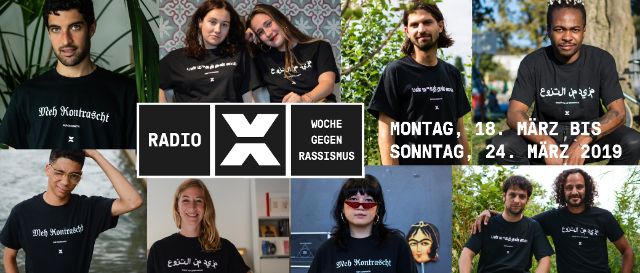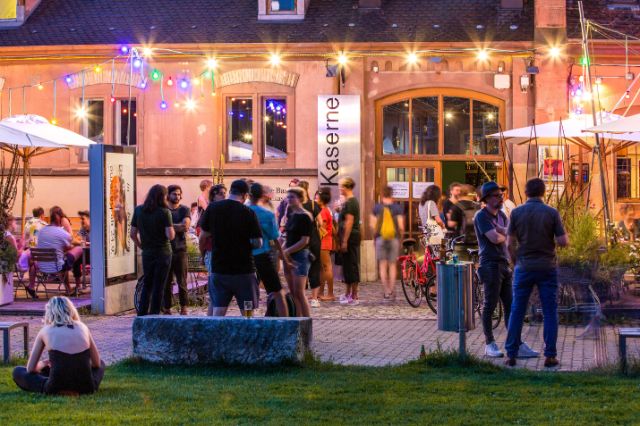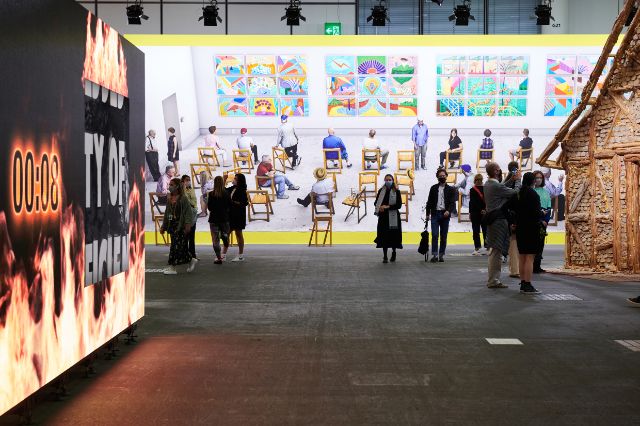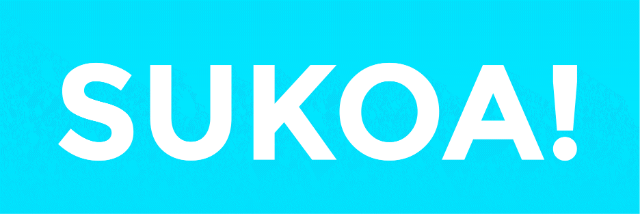Woche gegen Rassismus 2019

Pussy Riot am Tag des feministischen Streiks: "It is a very cruel moment to talk about pacifism right now"
Für das Punk und Performance Kollektiv Pussy Riot ist Protest eine Kunst. Und Revolt eine Lebensform. Am Dienstag, 14. Juni spielen sie in der Kaserne ihre Performance von Riot Days, eine theatralische Adaption des gleichnamigen Buches von Maria Alyokhina, welche darin ihre Erfahrungen in zwei jähriger russischer Gefangenschaft aufarbeitet. von Mirco Kaempf
Pussy Riot // Interview mit Olga Borisova
Das russische Punk und Performance Kollektiv spielt am 14. Juni in der Kaserne eine Adaption von Riot Days. Wir sprachen mit Olga Borisova, actress im Stück und creative editor des Buches Riot Days.
Es ist das erste Mal in drei Jahren, dass Pussy Riot wieder auf Europatournee sind. Und doch ist es gerade jetzt so passend: mit dem grossflächigen Angriffskrieg von Russland gegen die Ukraine erhält der Stoff von Riot Days erneut eine traurige Brisanz. Das Buch, geschrieben von Pussy Riot Mitglied Maria "Masha" Alyokhina reflektiert die Arbeit der Band, die Umstände der Entstehung und die Konsequenzen ihres Tuns. Nach dem berühmten "Punk Prayer" in der Christ-Erlöser-Kathedrale von 2012, einer der grössten christlich orthodoxen Kirchen der Welt, wurden Members der Band in einem langen (und im russischen Fernsehen übertragenen) Prozess zu zwei Jahren Gefangenschaft verurteilt. Doch der Protest ging weiter. Oder wie ein signature slogan der Band sagt: Anyone can be Pussy Riot.
Die Riot Days Tour diene zum einen, Geld für das Ohmatdyt Kinderspital in Kiew zu sammeln. Zum anderen, den Finger auf die Wunde zu legen: Putin sei ein Diktator, Faschist und Psychopath. Und der Westen verstecke sich hinter pazifistischen Argumenten, sagt uns Olga Borisova im Interview. Sie ist Teil von Pussy Riot und arbeitete zusammen mit Maria Alyokhina an Riot Days. Wir sprachen mit ihr vorab des Konzertes, welches am Dienstag 14. Juni in der Kaserne Basel stattfinden wird. Riot Days wird betitelt als eine revolutionary electronic punk opera.
"Everybody has a right to protest and has a voice. And this voice needs to be heard. I believe in personal stories and I believe personal stories can change the world. And definitely art can change the world" Olga Borisova
How has your tour been? Are you happy with reception and has the audience reacted as you hoped?
It's been already one and a half months of the tour and we are super excited because we meet so many people. The audiences are great and its lovely to see their reactions and solidarity. It gives us so much energy and hope because we want to fight against dictatorship together with the whole world.
When the audience cheers and applauds. What do you think they are applauding?
We have this moment in the show where we are saying "Russia will be free". It's not like the end of the show or anything but foreign audiences are really responding to it. Shouting and applauding. They feel for us. Even though they are Europeans they feel the struggle. And it's great to feel like we are all together in this and that we are allies. After the show, we are signing t-shirts and books and we get feedback. And it's great to talk about such issues and it's great to see they care about the war in Ukraine and that they want to support or donate or influence their politicians.
Do you think there is a difference between art and protest?
For us it's never been separated. What we are doing is political art. We chose this form to express our messages. I don't want to talk about "should all art be political" but I prefer political art. Because I am a political person and this is what touches me.
Do you consider Putin to be a fascist?
Yeah, I think he's a fascist. He's basically killing innocent people just because they don't want to obey his plans. He has this weird obsession with the Soviet Union and he doesn't care about the consequences. There's so many victims already. He's a murderer. He's a fascist. He's a psycho.
I'm sure you get this question a lot. But let me ask you this as well: Why are you not afraid of prison or violence?
Yeah, a lot of people are asking "why are you not afraid" but I think you should worry about Ukrainians right now. Not us. We are abroad right now, we are doing concerts, we have media attention etc. But innocent Ukrainians are now in constant danger. There are Russian political prisoners behind bars or are risking their freedom and life everyday protesting this war. They are in danger. It's not us you should worry about.
Do you believe in pacifism?
Pacifism is a very popular argument right now, to not help Ukraine. And I don't like it because this argument is used by politicians that refuse to send weapons. It is cruel and hypocritical right now to talk about pacifism. Because people are dying every day. They need help to protect themselves. You know I was 100% Pacifist before February 24th. After Putin started the war for me it was also a crash of my ideologies at some point. Right now, I am pro sending weapons to Ukraine because they need it. And they are asking for it. It is a very cruel moment to talk about Pacifism right now.
On Tuesday you are playing in Switzerland, one of the richest countries in the world who identify as politically neutral. What do you expect Switzerland to do against this war?
I expect Switzerland to help fight Putin. You are very known for your banks which are very protective of the assets of their clients. And there is a lot of Russian assets there. But those assets are stolen money. Stolen by Russian oligarchs and Putin’s gang, stolen from the Russian people. I think Switzerland could work with that. Because with Putin’s gang it's all about money. And the system is not working for free.
You are playing on the 14th of June on the day of the feminist strike. In Switzerland women have only been allowed to vote since 1971 and are in some ways still systematically treated as 2nd class citizens. Would gender equality also mean less war in the world?
Yes definitely. Because to me, war is also a result of the patriarchy. And we should all fight against patriarchy. This is the same narrative that we fight against when we fight dictatorships. If you look at the history, 99.9% of dictatorships are male. The whole narrative about a "strong leader conquering the world etc." is a very patriarchal.
In your opinion, do you think a song can change the world?
I believe in the culture of revolution. I believe that communities are greater and stronger than governments. Take our show as an example: It's based on Masha's story about her choice. But we tell the story to inspire other people. You don't need to be a superhuman. Everybody has a right to protest and has a voice. And this voice needs to be heard. I believe in personal stories and I believe personal stories can change the world. And definitely art can change the world. And culture.
Thank you for this interview!
Die Woche
Lesungen, Theater, Diskussion, Musik, Ausstellungen und vieles mehr: Die Woche gegen Rassismus 2019 in Basel bietet ein vielfältiges Programm, sie findet statt von: Montag, 18. März bis Sonntag, 24. März 2019
Radio X setzt in Zusammenarbeit mit unterschiedlichen Organisationen und Beteiligten ein Zeichen gegen Rassismus und andere Formen von Diskriminierung. Ziel ist es, die lokale Bevölkerung für das Thema zu sensibilisieren und gemeinsam in einen Dialog zu treten.
Während der ganzen Woche strahlt Radio X jeweils um 11:30 Uhr und um 16:30 Uhr thematische Beiträge aus.
Flyer Woche gegen Rassismus in Basel 2019
Medienmitteilung Woche gegen Rassismus 18.-24.3.19 mit Programm

Das Programm
Montag, 18. März 2019
Forumtheater "Sans Frontières" - Ein interaktiver Theaterabend zum Thema Diskriminierung und Rassismus.
19.30 Uhr, KLARA (Clarastrasse 13)
Eintritt frei.
Dienstag, 19. März 2019
Uni von unten: «Alltäglicher Ausnahmezustand: Racial Profiling in der Schweiz» mit Mohamed Wa Baile, Sarah Schilliger und Claudia Wilopo
19 Uhr, Internetcafé Planet 13 (Klybeckstrasse 60, 4057 Basel)
Eintritt frei.
Mittwoch, 20. März 2019
Liveübertragung Radio X, mit Interviews live vor Ort: Abendschule Import, Bla*Sh, Theater Niemandsland, Kulinarisches von Schnaboule Schnaboule und Musik zum Thema «Migration und Musik» mit Leila Moon.
17-22 Uhr, Keck Kiosk (Kaserne)
Ausstellung*: Bundes(asyl)lager- Zunehmende Isolierung und Kontrolle im Migrationsregime Schweiz
ab 19 Uhr in der Carambolage (Erlenstrasse 34, 4058 Basel)
Donnerstag, 21. März 2019
Podiumsdiskussion «Racial Profiling» mit szenischen Sequenzen des Theaters Niemandsland.
Auf dem Podium: Michel Hostettler (Community Policing Kleinbasel), Tobias Burkhard (Ausbildungsleiter KaPo BS), Nahom Mehret (Schweizer, geb. in Eritrea), Yvonne Apiyo Brändle-Amolo (SP Politikerin Zürich, Künstlerin).
Moderation: Bernard Senn, SRF
Mit dabei: BastA!, STOPP Rassismus u.a.
19 Uhr, Offene Kirche Elisabethen
Eintritt frei.
Ausstellung*: Bundes(asyl)lager- Zunehmende Isolierung und Kontrolle im Migrationsregime Schweiz
ab 19 Uhr in der Carambolage (Erlenstrasse 34, 4058 Basel)
Freitag, 22. März 2019
Bla*Sh, Legion Seven, Brandy Butler (CH)
Mehrstimmige Lesung, Performance, Konzert, Büchertisch
19 Uhr (Doors: 18.30 Uhr), Rossstall II, Kaserne Basel
Eintritt frei.
Ausstellung*: Bundes(asyl)lager- Zunehmende Isolierung und Kontrolle im Migrationsregime Schweiz
ab 19 Uhr in der Carambolage (Erlenstrasse 34, 4058 Basel)
Samstag, 23. März 2019
Afrika-Stadtrundgang des Zentrums für Afrikastudien
The tour will take place in English and is free of charge. Reservations are requested but not required.
14 Uhr, meeting point: at the pyramides in front of the Offene Kirche Elisabethen
Offener Hörsaal: Interaktiver Parcours**, über Hürden und Weichen auf dem schweizerischen Bildungsweg
16.00-18.30 Uhr, Foyer Junges Theater Basel
Eintritt frei.
Ausstellung*: Bundes(asyl)lager- Zunehmende Isolierung und Kontrolle im Migrationsregime Schweiz
ab 19 Uhr
Input: Wie die Schweiz Migrant*innen 2019 isoliert und verwaltet.
20 Uhr in der Carambolage (Erlenstrasse 34, 4058 Basel)
Sonntag, 24. März 2019
Afrika-Stadtrundgang des Zentrums für Afrikastudien auf Deutsch
14 Uhr, Treffpunkt: Pyramiden-Platz (Elisabethenstrasse)
Reservierung erbeten, aber nicht zwingend erforderlich.
Eintritt frei.
* Die Ausstellung beschäftigt sich mit der Neustrukturierung des Asylverfahrens und der Einführung der Bundeslager in der Schweiz. Mit der sogenannten Beschleunigung der Verfahren sollen Menschen effizienter verwaltet und ausgeschafft werden. Dafür nimmt das Staatssekretariat für Migration (SEM) Bundeslager in Betrieb, welche nicht nur die Unterbringung, sondern auch das gesamte Verfahren unter einem Dach zentralisieren und vereinheitlichen. Diese Praxis isoliert die betroffenen Menschen noch stärker vom Rest der Gesellschaft und lässt noch weniger Raum zur Selbstbestimmung. Um die Lagerpolitik umzusetzen, baut der Staat auf die Mitarbeit von Privatfirmen und NGOs.
** Bildungsparcours: Sprichst Du ausreichend Deutsch, um in der Schule mitzukommen? Wirst Du bei/auf deinem Bildungsweg unterstützt? Entsprichst Du den Bewertungskriterien des Schulsystems? Reicht das Geld für eine Ausbildung? Bringst Du die geforderten/nötigen Dokumente mit, um eine Ausbildung zu beginnen? Haben alle Menschen in der Schweiz dieselben Chancen auf Bildung? In einem interaktiven Parcours erfährst Du, welche Weichen gestellt werden und welche Hürden es zu überwinden gibt auf dem schweizerischen Bildungsweg. Ähnlich einem Leiter-Spiel, wirst Du, ausgestattet mit einer neuen Identität, unterschiedliche Aufgaben lösen, um Stufe für Stufe deinem Ziel näherzukommen.
Ausstrahlungstermine
Montag 18.3. - Sonntag, 24.3.19, täglich um 11.30 h (Wdh. 16.30 h)
Redaktionelle Beiträge auf Radio X zu diversen Themen in der Woche gegen Rassismus
u.a. mit FIASKO und STOPP Rassismus
Donnerstag 21.3., 18 h & Samstag 23.3.19, 13 h
Sendung X-Plus von Schüler/innen der FMS Münchenstein
Samstag 23.3., 16 h & Sonntag 24.3.19, 10 h
Ausstrahlung der Podiumsdiskussion zu "Racial Profiling" vom Donnerstag 21.3.19 in der Offenen Kirche Elisabethen
Kontakt
tatiana.vieira@radiox.ch
rebecca.haeusel@radiox.ch
Social Media
Die Woche gegen Rassismus wird unterstützt durch:









.png/jcr:content/magnolia-medium.png)

